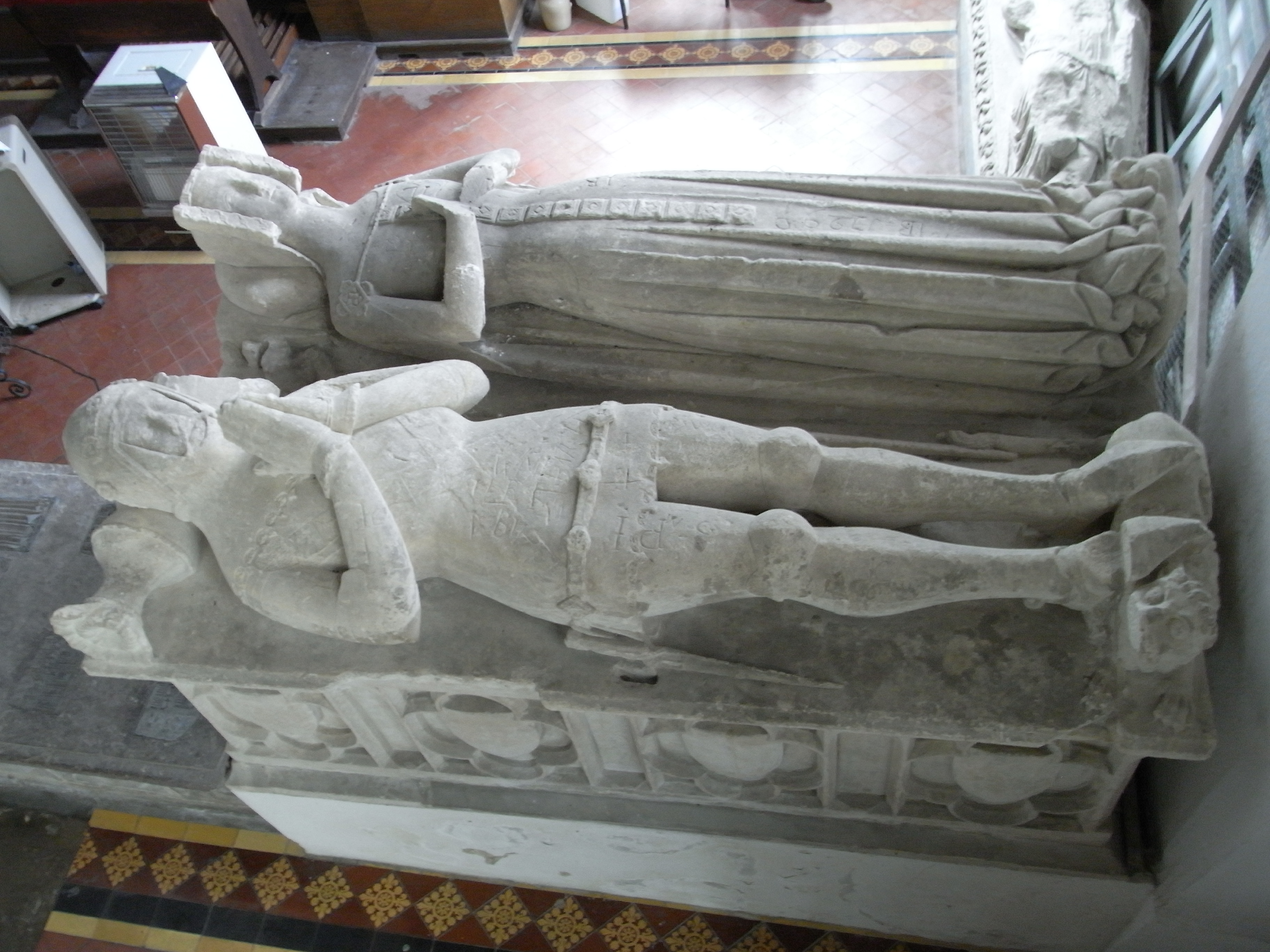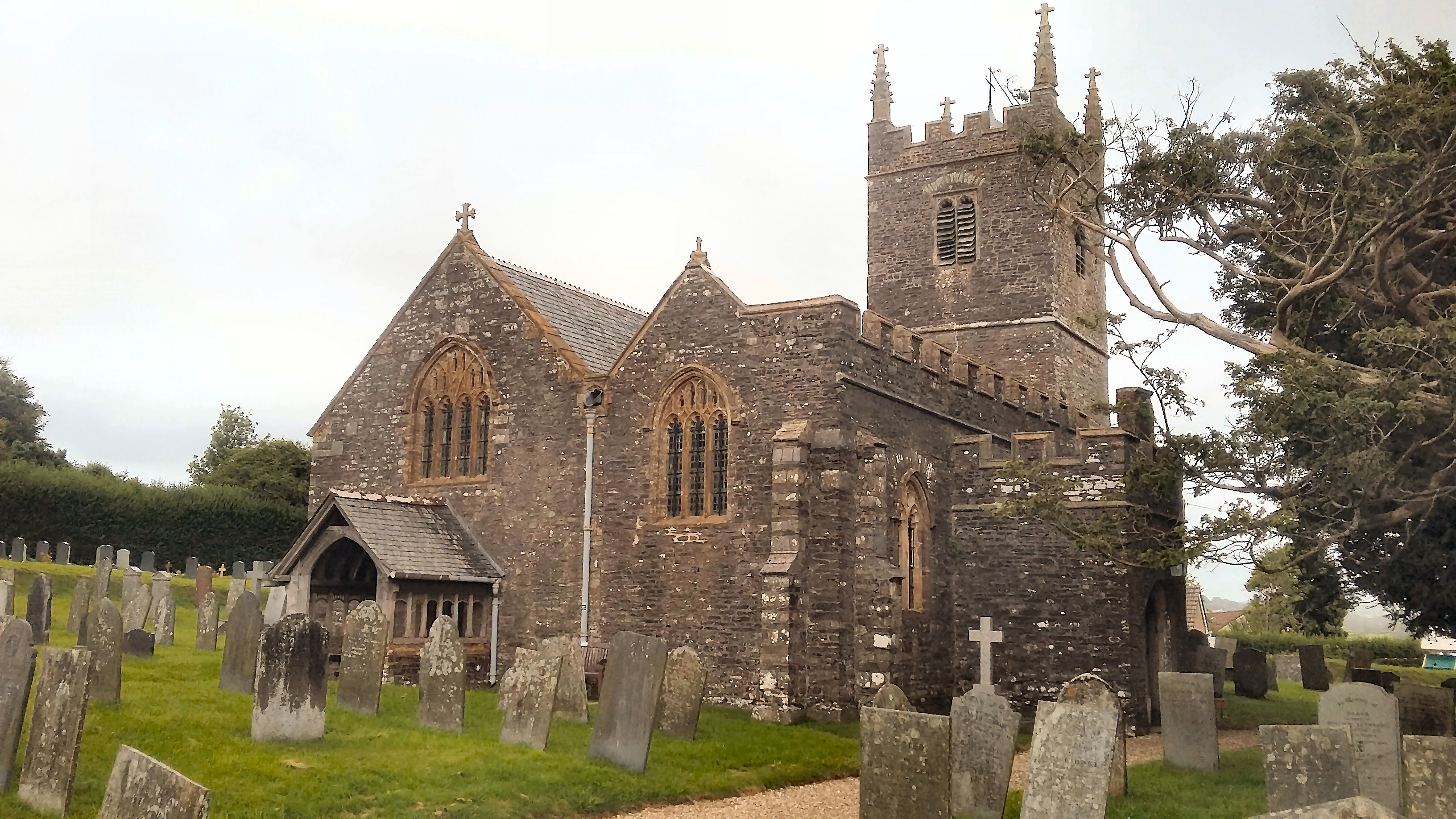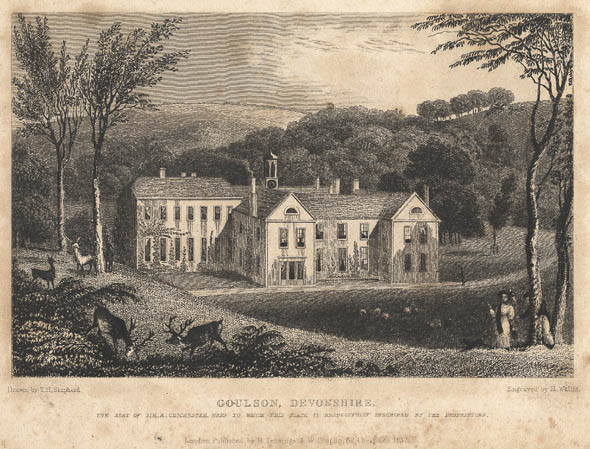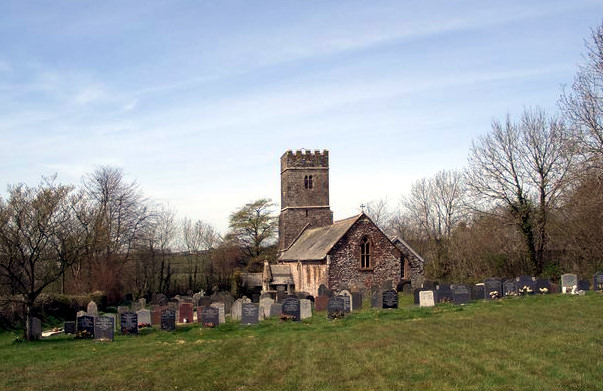|
Shirwell
Shirwell is a village, civil parish and former manor in the local government district of North Devon, in the county of Devon, England. It was also formerly the name of a hundred of Devon. The village lies about 3.5 miles north-east of the town of Barnstaple, to the east of the A39 road to Lynton. The parish is surrounded clockwise from the north by the parishes of East Down, Arlington, Loxhore, Bratton Fleming, Goodleigh, Barnstaple, West Pilton and Marwood. In 2001 its population was 333, little changed from the 1901 figure of 338. The parish church in the village is the church of St Peter which has 13th-century origins while the chancel is of 14th-century date. It underwent a Victorian restoration by the architect William White between 1873 and 1889. An effigy in the chancel is said to be of Blanche St. Leger (d.1483) and above this is a monument to Lady Anne Chichester (d. 1723). Other 18th-century monuments survive in the church. The aviator and sailor Sir Francis Chic ... [...More Info...] [...Related Items...] OR: [Wikipedia] [Google] [Baidu] |
Manor Of Shirwell
The Manor of Shirwell was a manor in North Devon, England, centred on the village of Shirwell and largely co-terminous with the parish of Shirwell. It was for many centuries successively the seat of two of the leading families of North Devon, the Beaumonts and their heirs the Chichesters of Raleigh, Pilton, both of which families were seated at the estate of Youlston within the manor of Shirwell. The manor house which survives today known as Youlston Park is one of the most architecturally important historic houses in North Devon and exists largely in its Georgian form, but retains many impressive late 17th-century interiors. Descent of the manor de Meulles In the Domesday Book of 1086 it was one of the 176 landholdings in Devon held in-chief by Baldwin de Meulles, Sheriff of Devon, who held the largest fiefdom in Devon and was the 1st feudal baron of Okehampton. Baldwin de Meulles' tenant at Shirwell as listed in Domesday Book was " Robert de Beaumont". The Courtenay family ... [...More Info...] [...Related Items...] OR: [Wikipedia] [Google] [Baidu] |
Manor Of Shirwell
The Manor of Shirwell was a manor in North Devon, England, centred on the village of Shirwell and largely co-terminous with the parish of Shirwell. It was for many centuries successively the seat of two of the leading families of North Devon, the Beaumonts and their heirs the Chichesters of Raleigh, Pilton, both of which families were seated at the estate of Youlston within the manor of Shirwell. The manor house which survives today known as Youlston Park is one of the most architecturally important historic houses in North Devon and exists largely in its Georgian form, but retains many impressive late 17th-century interiors. Descent of the manor de Meulles In the Domesday Book of 1086 it was one of the 176 landholdings in Devon held in-chief by Baldwin de Meulles, Sheriff of Devon, who held the largest fiefdom in Devon and was the 1st feudal baron of Okehampton. Baldwin de Meulles' tenant at Shirwell as listed in Domesday Book was " Robert de Beaumont". The Courtenay family ... [...More Info...] [...Related Items...] OR: [Wikipedia] [Google] [Baidu] |
Church Of St Peter, Shirwell
The Church of St Peter is the 13th-century Anglican parish church for the village of Shirwell in North Devon. It is a Grade I listed buildingChurch of St Peter: A Grade I Listed Building in Shirwell, Devon - Listed Buildings database and comes under the Diocese of Exeter.St Peter's Church in Shirwell - |
Francis Chichester
Sir Francis Charles Chichester KBE (17 September 1901 – 26 August 1972) was a British businessman, pioneering aviator and solo sailor. He was knighted by Queen Elizabeth II for becoming the first person to sail single-handed around the world by the clipper route and the fastest circumnavigator, in nine months and one day overall in 1966–67. Biography Early life Chichester was born in the rectory at Shirwell near Barnstaple in Devon, England, the son of a Church of England clergyman, Charles Chichester, himself the seventh son of Sir Arthur Chichester, 8th Baronet. His mother was Emily Annie, daughter of Samuel Page. At the age of six he was sent as a boarder to The Old Ride Preparatory School for boys, then attended Marlborough College during World War I. At the age of eighteen Chichester emigrated to New Zealand where in ten years he built up a prosperous business in forestry, mining and property development, only to suffer severe losses in the Great Depression. Aviat ... [...More Info...] [...Related Items...] OR: [Wikipedia] [Google] [Baidu] |
Shirwell Town - Geograph
Shirwell is a village, civil parish and former manor in the local government district of North Devon, in the county of Devon, England. It was also formerly the name of a hundred of Devon. The village lies about 3.5 miles north-east of the town of Barnstaple, to the east of the A39 road to Lynton. The parish is surrounded clockwise from the north by the parishes of East Down, Arlington, Loxhore, Bratton Fleming, Goodleigh, Barnstaple, West Pilton and Marwood. In 2001 its population was 333, little changed from the 1901 figure of 338. The parish church in the village is the church of St Peter which has 13th-century origins while the chancel is of 14th-century date. It underwent a Victorian restoration by the architect William White between 1873 and 1889. An effigy in the chancel is said to be of Blanche St. Leger (d.1483) and above this is a monument to Lady Anne Chichester (d. 1723). Other 18th-century monuments survive in the church. The aviator and sailor Sir Francis C ... [...More Info...] [...Related Items...] OR: [Wikipedia] [Google] [Baidu] |
Raleigh, Pilton
The historic manor of Raleigh, near Barnstaple and in the parish of Pilton, North Devon, was the first recorded home in the 14th century of the influential Chichester family of Devon. It was recorded in the Doomsday Book of 1086 together with three other manors that lie within the later-created parish of Pilton. Pilton as a borough had existed long before the Norman Conquest and was one of the most important defensive towns in Devon under the Anglo-Saxons. The manor lies above the River Yeo on the southern slope of the hill on top of which exists the ruins of the Anglo-Saxon hillfort of Roborough Castle. The historic manor of Raleigh is now the site of the North Devon District Hospital. Domesday Book Under the heading ''Terra(e) Ep(iscop)i Constantiensis'' ("Lands of the Bishop of Coutances" (Geoffrey de Montbray (died 1093)) and under the sub heading ''Infra scriptas t(er)ras tenet Drogo de Ep(iscop)o'' ("The undermentioned lands Drogo holds from the Bishop"), is the follo ... [...More Info...] [...Related Items...] OR: [Wikipedia] [Google] [Baidu] |
Chichester Baronets
There have been three baronetcies created for persons with the surname Chichester, one in the Baronetage of England and two in the Baronetage of the United Kingdom. Only the 1641 creation is extant. Chichester baronets, of Raleigh (1641) The Chichester Baronetcy, of Raleigh in the County of Devon, was created in the Baronetage of England on 4 August 1641 for John Chichester (1623–1667). 1st Baronet John Chichester (1623–1667) was MP for Barnstaple, Devon. Raleigh was a manor held by the Chichester family in the parish of Pilton, near Barnstaple. He was the son of Sir Robert Chichester, knight, (1579–1627) of Raleigh (whose monument with effigies exists in Pilton Church) by his second wife Ursula Hill. Sir Robert was the son of Sir John Chichester by his wife Ann Denys, daughter of Sir Robert Denys (d.1592), MP, of Holcombe Burnell, Devon. Sir John was the eldest surviving son of Sir John Chichester (d.1569), knight, of Raleigh, whose elaborate monument (without eff ... [...More Info...] [...Related Items...] OR: [Wikipedia] [Google] [Baidu] |
Devon
Devon ( , historically known as Devonshire , ) is a ceremonial and non-metropolitan county in South West England. The most populous settlement in Devon is the city of Plymouth, followed by Devon's county town, the city of Exeter. Devon is a coastal county with cliffs and sandy beaches. Home to the largest open space in southern England, Dartmoor (), the county is predominately rural and has a relatively low population density for an English county. The county is bordered by Somerset to the north east, Dorset to the east, and Cornwall to the west. The county is split into the non-metropolitan districts of East Devon, Mid Devon, North Devon, South Hams, Teignbridge, Torridge, West Devon, Exeter, and the unitary authority areas of Plymouth, and Torbay. Combined as a ceremonial county, Devon's area is and its population is about 1.2 million. Devon derives its name from Dumnonia (the shift from ''m'' to ''v'' is a typical Celtic consonant shift). During the Briti ... [...More Info...] [...Related Items...] OR: [Wikipedia] [Google] [Baidu] |
Youlston Park
Youlston Park also known as Youlston House is a privately-owned 17th-century mansion house situated at Shirwell, near Barnstaple, North Devon, England. It is a Grade I listed building. The parkland is Grade II listed in the National Register of Historic Parks and Gardens. The game larder and stables are individually listed Grade II. The pair of entrance lodges are listed Grade II*. The mediaeval origins of the house including a detached hall and a kitchen block were incorporated into the new house built in the late 17th century by Sir Arthur Chichester, 3rd Baronet, Member of Parliament for Barnstaple, who died in 1718. (He was a younger son of the first of the Chichester baronets There have been three baronetcies created for persons with the surname Chichester, one in the Baronetage of England and two in the Baronetage of the United Kingdom. Only the 1641 creation is extant. Chichester baronets, of Raleigh (1641) The ....) The south-facing two-storey entrance front has se ... [...More Info...] [...Related Items...] OR: [Wikipedia] [Google] [Baidu] |
Arlington, Devon
Arlington was a manor, and is a village and civil parish in the North Devon district of Devon in England. The parish includes the villages of Arlington and Arlington Beccott. The population of the parish is 98 (2001 census). Arlington Court, long owned by the Chichester family, lords of the manor since the 14th century, is now owned by the National Trust and home to the Trust's collection of over 50 historic horse-drawn carriages. Victoria Cross holder Sir Mark Walker lived in Arlington, dying there in 1902. Descent of the manor The manor of "Alferdintone" (Arlington) was listed in the Exeter Domesday Book of 1086 as held by "Alvred de Ispania" (Alfred of Spain) as a tenant-in-chief of the king. The estate of Twitchen, now a farm within Arlington parish, was stated to have been added to the manor of Arlington. Alfred also held Orway, and held no other lands in Devon. It later was acquired by the de Raleigh family, lords of the manor of Raleigh in the parish of Pilton. For ... [...More Info...] [...Related Items...] OR: [Wikipedia] [Google] [Baidu] |
Loxhore
Loxhore is a small village, civil parish and former manor in the local government district of North Devon in the county of Devon, England. The parish, which lies about five miles north-east of the town of Barnstaple, is surrounded clockwise from the north by the parishes of Arlington, Bratton Fleming and Shirwell. In 2001 its population was 153, down from the 202 residents it had in 1901. The parish church, dedicated to St Michael, was built in the 15th century and restored in several stages from before 1844 to c. 1900. Despite the restoration it retains several notable features including its screen, two pillars of the north arcade which are of oak instead of the usual stone, a decorated 16th-century font cover, and monuments to the Hammond family. Other notable features in the parish are Roborough Castle, Cunnilear Camp (an Iron Age hill fort), a small motte on a hill with wide views, and the small house of Hill which has late medieval origins. The Manor of Loxhore was onc ... [...More Info...] [...Related Items...] OR: [Wikipedia] [Google] [Baidu] |
North Devon
North Devon is a local government district in Devon, England. North Devon Council is based in Barnstaple. Other towns and villages in the North Devon District include Braunton, Fremington, Ilfracombe, Instow, South Molton, Lynton and Lynmouth. The district was formed on 1 April 1974 as a merger of the Barnstaple municipal borough, the Ilfracombe and Lynton urban districts, and the Barnstaple and South Molton rural districts. The wider geographic area of North Devon is divided between North Devon District and the district of Torridge, based in Bideford. Population North Devon is popular with retired people. The 2011 census showed that 18% of residents were aged 15 years and under, 60% were aged 16–64 and 23% were aged 65 and over. This compares to the 20% of the population who were aged 65 and over when the 2001 census was taken. For comparison, the same age distributions across England were 19%, 64% and 17% respectively. Life expectancy for men, at 77.7, is close to the E ... [...More Info...] [...Related Items...] OR: [Wikipedia] [Google] [Baidu] |






